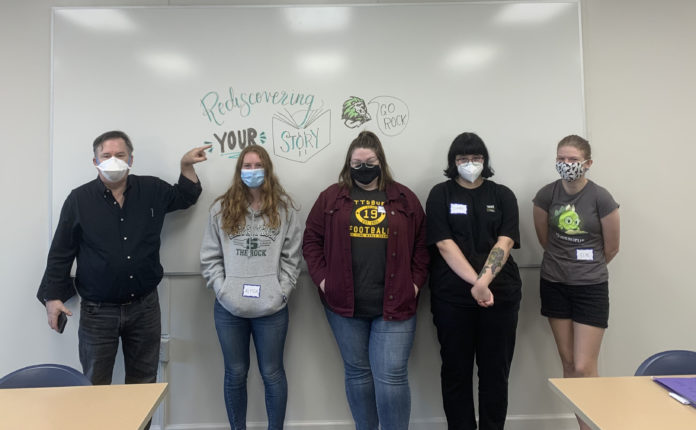Returning to in-person learning this fall, the English department offered a brand new course. Writing Community Stories is currently taught by Mark O’Connor, associate professor in the English department.
The class objectives are to move students outside of the classroom, engage with the community and tell the story of members in and around the Butler community. Specifically, this course is working with people who are recovering from addictions.
On Wednesday nights over a course of five weeks five students in the class taught creative writing and interviewed individuals at the Butler SUCCEED (SRU Center for Community Engagement, Empowerment and Development) project in downtown Butler. To gain a wider range of voices, students in this class have also interviewed family members of individuals who have struggled with addiction or died and counselors who work with those in recovery.
The Butler SUCCEED project is a place and concept where the Office for Community Engaged Learning, the Sustainable Enterprise Accelerator and the Institute for Nonprofit Leadership come together to connect SRU students and members of the Butler community.
Alice Del Vecchio, an associate professor, department chair for the department of nonprofit management, empowerment and diversity studies and director for the Institute for Nonprofit Leadership, has been involved with Butler SUCCEED project since it started. In early September the Butler SUCCEED center opened.
Del Vecchio connected with O’Connor before the semester began and suggested that the Writing Community Stories class could become a service-learning project. As the backbone of the project, Del Vecchio connected O’Connor with the Institute for Nonprofit Leadership Substance Use Disorder VISTA, Kayla Rennie and Butler County Director of Drug and Alcohol, Donna Jenereski.
“It takes a village. So we all utilized our skills and did this awesome project,” Rennie said.
As students in the class have come to learn, there is a lack of voices representing the reality of addiction.
“I think there is a sense in American society that people who fall prey to overdose or an addiction, are just, you know, not fully human or subhuman or something,” O’Connor said. “And I think that part of what we’re doing is at least trying to get a full story to counterbalance that narrative.”
One of the biggest takeaways from these interviews is the honesty and willingness of individuals to share their very personal stories. O’Connor has found a way to structure the class to not only benefit students in their creative writing skills but also conducting oral history interviews. The students were ready for the challenges this class had from the start.
“These [students] were on week twelve the first night because they’re ready to write and share their stories,” O’Connor said.
Melina Bowser and Claire Kleffman, who are both creative writing majors, spoke about how this class has allowed them to understand that the stereotypes that exist around addiction are not necessarily correct.
“All together, it’s a great class, and I’m glad that we have to take it for the major because it gives us exposure to it,” Bowser said.
Not only are students gaining more writing skills and different experiences to help their major but they are also gaining insight to issues happening in the community that they wouldn’t otherwise be exposed to.
“It’s really heartwarming that they’re willing to share their stories with us for no reason,” Bowser said. “We’re just asking them to tell us about themselves and they are.
“A lot of stuff is really heartbreaking but I really enjoy getting to meet them and hear their stories. I think it helps them as they talk about it.”
With the stigma around addiction, many people aren’t comfortable hearing about what’s happening in the local community. Many people seem to put their heads down and avoid it. The project has been an eye opener for students, faculty and community members involved.
“You have no idea what’s going on in people’s lives,” O’Connor said. “It’s extraordinary.
“So from my perspective, as a teacher and as a writer, I’m super glad we’re doing this project. It’s great. It’s informative. It’s amazing. It’s real. It’s America 2021.”
The coursework done this semester by the thirteen students enrolled, has helped create, as O’Connor said, “Art that didn’t exist before that moment.” The class has given a platform for recovery stories to be shared with the public.
The end product for this class is an anthology of creative writing and interviews that students have conducted over the course of the semester. The anthology will be printed and read aloud by authors and students on Dec. 1 at 5 p.m. at the Butler SUCCEED building, 150 N. Main St, Butler, PA 16001.
“Celebration of Authors” is the event where the anthology will be read and is open to anyone interested in attending. It is meant to be a celebration of recovery for the participants of the creative writing workshop.
This event and the end of the course are not meant to be the end of this important conversation. Ideally, the anthology can be used as a community education tool that policy makers and leaders in the Butler community can use to help influence the culture of Butler.
It will take a village to share these recovery stories and help change the addiction statistics that are prevalent in Butler County. Writing Community Stories and participation at the Butler SUCCEED house are small steps towards widespread change in the community surrounding SRU.








